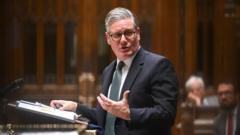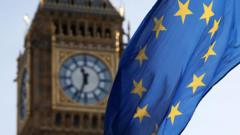Recent estimates show migration down significantly as new government policies take effect, reflecting ongoing tensions and political discourse around immigration control.
Sharp Decline in UK Immigration Signals Shifting Policies

Sharp Decline in UK Immigration Signals Shifting Policies
Official data reveals a 50% drop in net migration for 2024, marking a significant change in the immigration landscape following Brexit.
Britain is experiencing a notable decrease in immigration, with official figures revealing a staggering 50% lower net migration in 2024 compared to the previous year. This trend, reported on May 22, 2025, suggests a significant shift away from the immigration patterns that had surged post-Brexit.
Prime Minister Keir Starmer had just recently emphasized the need to "take back control of our borders," expressing concerns that unchecked immigration could transform the country into "an island of strangers." This announcement coincides with new governmental statistics estimating net migration for the past year at 431,000, down from 860,000 in 2023, indicating that Britain may be entering a new era of tighter immigration policies.
Experts point to the stringent measures enacted by the preceding Conservative administration as the main driving force behind this decline. The government had faced immense pressure to manage the surging immigration resulting from Brexit complications, and now these tightened measures are carrying through to Starmer’s Labour government, which is under similar scrutiny.
The fluctuations in migration numbers illuminate the contentious nature of the immigration debate in the UK, particularly as it relates to the Brexit experience. Critics argue that the current political narrative, fueled by rising populism, is often misaligned with the realities reflected in the data. “The previous government essentially set up Starmer for this moment by implementing policies that would reduce migration,” commented Sunder Katwala of British Future, highlighting the intricate dynamics at play.
The statistics published by the Office for National Statistics note a dramatic drop in arrivals associated with work and educational visas, along with a corresponding uptick in emigration. Notably, there has been an 86% reduction in the number of dependents accompanying foreign students, showcasing government efforts to limit family links in visa policies.
As the conversation about immigration continues, the implications of these statistics will likely resonate throughout the political spectrum, influencing both policy and public sentiment in the years to come. The situation remains inextricably linked to Britain’s ongoing negotiation of its post-Brexit identity and socio-political landscape.
Prime Minister Keir Starmer had just recently emphasized the need to "take back control of our borders," expressing concerns that unchecked immigration could transform the country into "an island of strangers." This announcement coincides with new governmental statistics estimating net migration for the past year at 431,000, down from 860,000 in 2023, indicating that Britain may be entering a new era of tighter immigration policies.
Experts point to the stringent measures enacted by the preceding Conservative administration as the main driving force behind this decline. The government had faced immense pressure to manage the surging immigration resulting from Brexit complications, and now these tightened measures are carrying through to Starmer’s Labour government, which is under similar scrutiny.
The fluctuations in migration numbers illuminate the contentious nature of the immigration debate in the UK, particularly as it relates to the Brexit experience. Critics argue that the current political narrative, fueled by rising populism, is often misaligned with the realities reflected in the data. “The previous government essentially set up Starmer for this moment by implementing policies that would reduce migration,” commented Sunder Katwala of British Future, highlighting the intricate dynamics at play.
The statistics published by the Office for National Statistics note a dramatic drop in arrivals associated with work and educational visas, along with a corresponding uptick in emigration. Notably, there has been an 86% reduction in the number of dependents accompanying foreign students, showcasing government efforts to limit family links in visa policies.
As the conversation about immigration continues, the implications of these statistics will likely resonate throughout the political spectrum, influencing both policy and public sentiment in the years to come. The situation remains inextricably linked to Britain’s ongoing negotiation of its post-Brexit identity and socio-political landscape.




















